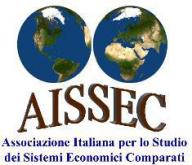Edited by Marta Marson, University of Turin and OEET
Newsletter n. 16| September 2020 - Download PDF
Covid-19 has affected and is affecting the lives of many, and it is also reshaping economic policy approaches and perhaps the priorities and values underlying them. The impacts on poor countries and vulnerable groups call for a deeper consideration and allow an assessment of the overall consistency of priorities and ethical values on which decisions are based, and of their equity.
In advanced economies public health has affirmed its priority over economic considerations, leading to the acceptance of two distinct types of costs. First, the lock-downs, to prevent contagions, imply very high costs especially for vulnerable groups, outside formal employment and social protection systems, and for businesses, which negatively affects the medium and long-term economic outlook[1] and the opportunities for young people. Second, the emergency has shown the need to increase public spending, particularly in the primary and territorial health sector and to compensate for the loss of earnings. Countries whose population is older, hence generally developed countries, are the ones which adopted more stimulus measures,[2] even financed with debt and derogating fiscal stability in Europe. We have here a somehow unprecedented affirmation of the priority of protecting human lives. In most developing countries instead dying because of a trivial disease is normal, even when suitable treatment is well known and cheap, but simply not accessible to many. Diarrhoea was the second leading cause of death in developing countries in 2016 with almost 2 million deaths.[3] To properly treat diseases like diarrhoea, malaria, or flu, the enhancement of primary health services is necessary, just like for Covid-19. Nonetheless, the orthodoxy of structural adjustment in developing countries and the subsequent consensus has generally discouraged this type of investments, so that current health expenditure in 2017 accounted for less than 6% of GDP in developing countries (WDI data) and less than half of this expenditure came from public funding. These figures are particularly striking because the pandemic proved that healthcare services were far below standards even in many advanced countries where the ratio of health expenditure to GDP is over 12%, more than double the proportion in the developing countries, and the public share is also higher. Now a first issue is why deaths by Covid-19 question economic orthodoxy and those in developing countries, despite they were there for all to see for a long time, do not. A simple, but somewhat brutal, answer is that it depends on the availability of financial resources and this raises the issue of international cooperation for the Covid-19 emergency, which is addressed by Annalisa Prizzon in her article in this newsletter. Governments are willing to spend to protect their citizens, but this cannot be done if the pandemic is not controlled at the global level. The effects of the lock-down in developing countries, as discussed in detail by the articles by Frigero and Wang and by Caria in this newsletter, are very tough, particularly for vulnerable groups. And lock-down measures are not only aimed at protecting local public health, but even more at protecting global public health. The Covid-19 crisis shows how the sustainability of our production systems requires urgent interventions and global coordination solutions, as shown by Francesco Rampa in his article about food systems and the “One Health” approach. There is also a need for a strong framework to integrate issues affecting different countries and generations, as shown by Colombano and Navarro who focus on the 2030 Agenda. The responses to the Covid-19 crisis were game-changing, and disruptive with respect to economic orthodoxy, affirming a priority of the protection of human life, which is of course very positive. There is nonetheless the risk that such a new approach might reaffirm existing inequalities, discriminating vulnerable groups, poor countries, and future generations.
As anticipated, this newsletter includes a first contribution by Piercarlo Frigero and Xieshu Wang discussing the impact of Covid-19 on development and the risks of increased inequalities between the rich and the poor, as well as various dangers possible to harm the indigenous peoples. The outbreak and expansion of the pandemic have greatly challenged our complex social dynamics and has exposed the fragility of our systems. Compared to countries with better welfare and higher resilience, the crisis might bring much worse consequences and produce lasting negative impact in poor regions lacking social protection and food security, where people live in precarious situations and depend largely on informal economy.
The second article, by Sara Caria, enters into details on the pandemic in Latin America, one of the most unequal region of the world and also the most urbanized among developing countries, while high rates of informality and fragile social protection systems also contribute to making it particularly vulnerable. The article presents trends in international trade flows and explains that Latin America is going to be the most affected region in the world: a contraction of approximately 9,1% of GDP on average, less serious in Central America, and sharper in the Southern part of the region, is predicted.
The next three articles stress the importance of international cooperation, under three different angles. Annalisa Prizzon offers an interesting analysis about how developing countries’ governments are trying to reallocate resources to health care and plan expansionary fiscal policies to kick-start economic recovery in the face of the Covid-19 crisis. The article explains that, however, funding has dried up, the tax base has shrunk and the demand for exports has plummeted in many countries because of trade and travel restrictions. Many countries are very likely to seek additional external assistance because other financing options are simply no longer available or at least not at the scale needed. While other sources decline and fiscal needs expand, development aid is one of the few financing options that remain for many countries as it is less pro-cyclical than other development finance flows and it is in the interest of all countries to support emergency and recovery efforts against Covid-19 as well as the provision of vaccines.
Francesco Rampa underlines the necessity of building more resilient and sustainable food systems taking into account the connection between humans, animals, plants and their shared environments, which should be seen as long-term answers to multiple global challenges, including the ability to respond to pandemics. Both public and private investments are urgently needed, as well as new mechanisms to reduce investment risk associated with the food and agricultural sector in low-income countries. He also strengthens that the same level of importance should be given to a stronger global coordination in specific territories and in line with the local circumstances. And as a number of decisive summits are scheduled from October 2020 to the end of 2021, Europe who has already channelled significant aid to the Global South in their response to the pandemic and has the ambition to be a global leader in sustainability, could do more to assume the leadership in food and health action as response to Covid-19.
Joe E. Colombano and David N. Nabarro, consider the Covid-19 crisis in the framework of the global 2030 agenda. They take a “system of systems approach” and consider how the virus negatively impacts on the 17 Sustainable Development Goals, but also find that the 2030 agenda can be helpful in bringing some form of order to the analysis of the effects brought about by the Covid-19 pandemic, and the shocks that it inflicts to the complex network of relationships, co-benefits and trade-offs that constitute sustainable development. The global reset triggered by the crisis is an opportunity for a better recovery, to rebound forward towards realizing a sustainable world, rather than backward to the original system with its flaws, as we did, for example, after the 2008 financial crisis. This is how we can turn this global pandemic into the opportunity to start anew and realize the vision of a fairer and more sustainable world.
[1] https://www.imf.org/en/Publications/WEO/Issues/2020/06/24/WEOUpdateJune2020
[2] Stock, J.H., (2020). Data gaps and the policy response to the novel coronavirus, Covid Economics Vetted and Real-Time Papers, Issue 3, 10 April 2020
http://www.amcham-egypt.org/bic/pdf/corona1/Covid%20Economics%20by%20CEPR.pdf#page=44
[3] https://www.who.int/news-room/fact-sheets/detail/the-top-10-causes-of-death









